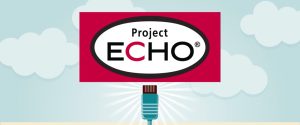Home / News /
Project ECHO: Early Hearing Detection and Intervention – Building Expertise through Collaboration
 September 13, 2023 – In today’s evolving healthcare landscape, the need for effective knowledge sharing and interdisciplinary collaboration has never been greater. Project ECHO (Extension for Community Health Outcomes) offers an innovative approach to healthcare delivery. Project ECHO fosters a community of practice to enhance the competence and confidence of healthcare providers across various disciplines.
September 13, 2023 – In today’s evolving healthcare landscape, the need for effective knowledge sharing and interdisciplinary collaboration has never been greater. Project ECHO (Extension for Community Health Outcomes) offers an innovative approach to healthcare delivery. Project ECHO fosters a community of practice to enhance the competence and confidence of healthcare providers across various disciplines.
What is Project ECHO?
Project ECHO, often referred to simply as ECHO, is a pioneering online service delivery model designed to bridge the gap between experts and healthcare practitioners through a hub-and-spoke framework. At its core, the ECHO model revolves around case-based guided practice, combining didactic instruction with real-life case presentations to facilitate knowledge sharing and capacity building.
Key Components of Project ECHO:
Interdisciplinary Collaboration: ECHO brings together experts and participants from diverse healthcare backgrounds, creating a rich, interdisciplinary environment where knowledge can flow freely.
Hub-and-Spoke Model: The ECHO network is structured like a wheel, with a central hub that houses experts and multiple spokes representing the participants. This model promotes efficient information dissemination and collaborative learning.
Case-Based Learning: Sessions involve brief didactic instruction on specific topics followed by the presentation of real-life cases. This approach encourages active engagement and problem-solving among participants.
Remote Connectivity: ECHO sessions are conducted remotely, leveraging video conferencing technology like Zoom. This accessibility breaks down geographical barriers, allowing professionals from various locations to participate.
Community of Practice: ECHO aims to create a community of practice where healthcare providers can share their experiences, learn from one another, and collectively improve patient care.
Understanding Project ECHO Sessions
Typically, Project ECHO sessions last between 1 to 1.5 hours and can accommodate up to 100 participants. Hub teams consist of experts from relevant disciplines, ensuring comprehensive coverage of the topics discussed. Each session begins with a short workshop providing didactic instruction on a specific subject. Following this, a real-life case is presented by one of the participants (spokes). The ensuing discussion involves collaborative problem-solving, with multidisciplinary suggestions and recommendations being shared in relation to the presented case.
Early Hearing Detection and Intervention ECHO
One exciting opportunity within the Project ECHO framework is the Early Hearing Detection and Intervention (EHDI) ECHO program, which is currently recruiting participants. This initiative is particularly relevant for pediatricians and other pediatric clinicians, as well as professionals involved in EHDI, such as pediatric audiologists, AAP EHDI Chapter Champions, EHDI state and territory coordinators, early interventionists, and educators.
The EHDI ECHO will concentrate on critical aspects of newborn hearing screening, diagnosis, and intervention, addressing a crucial area of child health and development. By participating in this ECHO, healthcare providers can expand their knowledge, collaborate with peers, and enhance their ability to deliver timely and effective hearing-related care to infants.
Important Details for the Early Hearing Detection and Intervention ECHO:
Start Date: The EHDI ECHO program is scheduled to begin on October 4th at 2 p.m. CDT.
Frequency: Participants will meet monthly to engage in discussions and share insights.
Registration: Interested professionals can register for the EHDI ECHO program to become part of this valuable community of practice and contribute to the betterment of early hearing detection and intervention.
Registration Online.
Learn more about Project ECHO.


